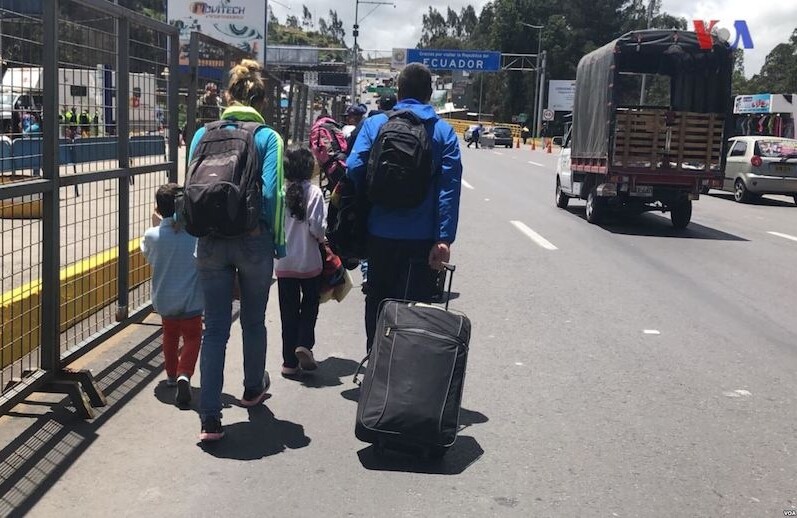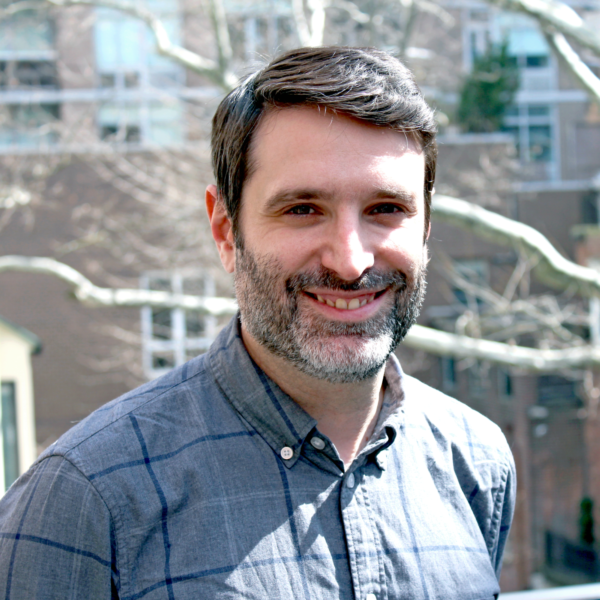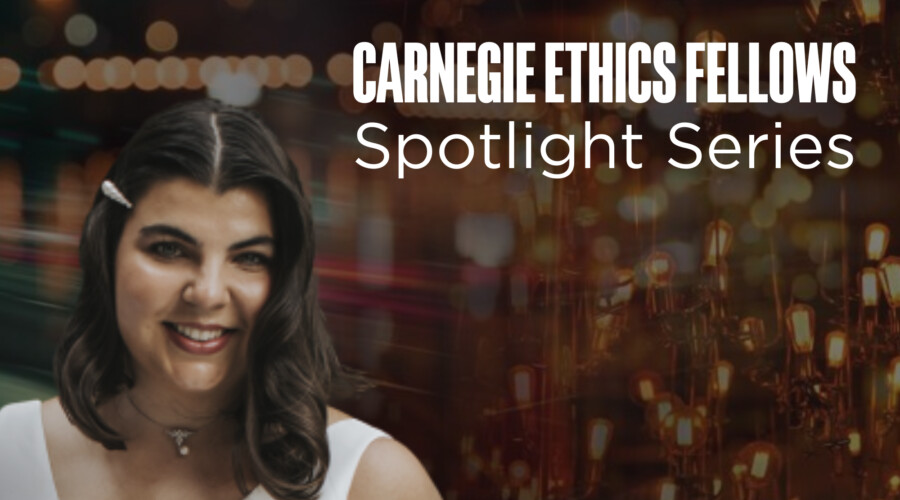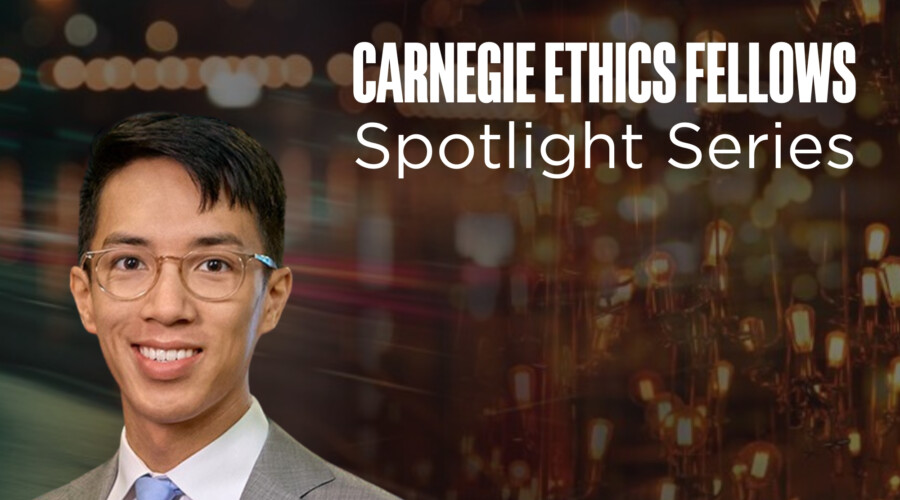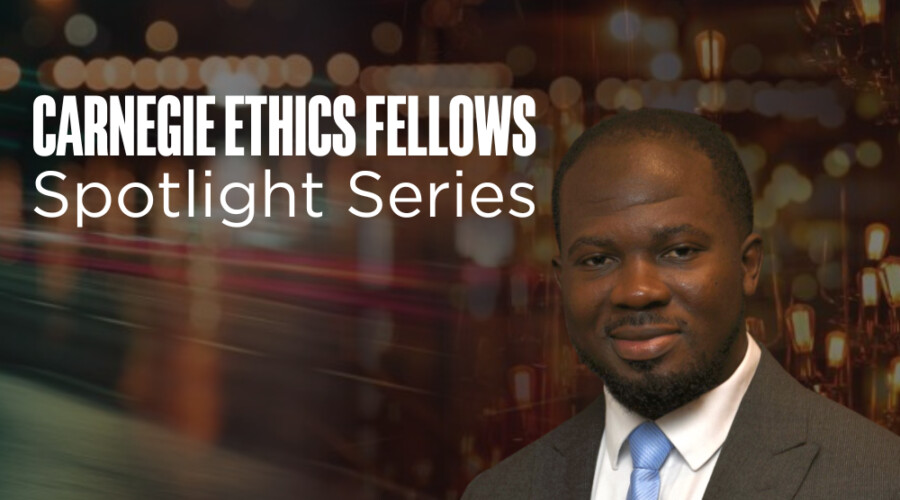Political scientist Daniela Segovia, currently an Eisenhower Fellow, discusses the importance of empathy when working on and thinking about migration policy in Latin America. She also touches on her own story as a Venezuelan migrant living in Mexico. What should governments and international organizations be doing? How can concerned citizens help?
ALEX WOODSON: Welcome to Global Ethics Weekly. I'm Alex Woodson from Carnegie Council in New York City.
This week's podcast is with foreign policy analyst Daniela Segovia. Daniela is an Eisenhower Fellow, a lecturer at Ortega y Gasset Research Institute in Mexico, and a Carnegie New Leader.
Daniela and I spoke about migrants and refugees in the Americas, focusing on Venezuelans and Central Americans, and the importance of empathy when researching and thinking about migration. We also discussed the role of governments and international organizations, what they can do to help migrants and, conversely, how they have encouraged xenophobia.
In addition, we touched on Daniela’s story, as she is a Venezuelan migrant, herself, now living in Mexico.
Special thanks to Carnegie Council's Amanda Ghanooni and the Eisenhower Fellowship in Philadelphia for helping to set up this podcast.
For now, here’s my talk with Daniela Segovia.
Thank you so much for coming today, Daniela.
DANIELA SEGOVIA: Thank you for having me here.
ALEX WOODSON: We're going to talk today about immigration. We're going to focus on Latin America, on Venezuela and Central America, and maybe get into a few other immigration situations as well. To start off this conversation, what would you like listeners to know about Venezuelan migration, Central American migration, just to give this conversation some context?
DANIELA SEGOVIA: There are many topics, but I would like to outline the emotional theme, the fact that migrants—we are not only a number, we are not only a figure, we are human beings. We have rights. There are many things on the table, but I would like to raise awareness about what is happening right now in the Americas.
For example, Venezuelans are the second-largest [group] of migrants [in the world]. Not many people know about that because it's not in the media, at least in Europe, for example, or in the United States. People talk more about other crises, but that is happening right now in South America.
ALEX WOODSON: You are originally from Venezuela, right?
DANIELA SEGOVIA: I am from Caracas, yes. I am a political scientist. I am a policymaker. While I used to work in the foreign affairs sector, last year I began to work on this project about international organizations and their role in the Venezuelan issue, but I decided to expand the topic because it's not only about Venezuela, it's also happening in Central America, in Mexico, and, of course, in the United States. We are witnessing serious human rights violations everywhere.
ALEX WOODSON: You're in the Eisenhower Fellowship right now.
DANIELA SEGOVIA: Yes.
ALEX WOODSON: What does that mean exactly, for people who might not be aware of the Eisenhower Fellowship? What does that mean, and what are you doing as an Eisenhower Fellow?
DANIELA SEGOVIA: It's a non-profit organization. It's based in Philadelphia. There is a program, in this case for people from Latin America and the Caribbean. I now represent Mexico, because in Mexico migration is a very serious issue. I competed with my project, and I was selected. We are two Mexicans. I am recognizing myself as a Mexican, but I am Venezuelan.
I'm working in mapping actors to draft a strategy about how to respond more effectively about migration and how to take into account the human dimension.
There are many things. There are many initiatives, very well drafted for example, the Global Compact for Migration that was signed last year. There are good frameworks. We have to respect that the states signed before. It's not only about papers.
Also, I would like to see how cybersociety can be included to promote solutions for the migrants.
ALEX WOODSON: What would you like specifically for people to know about what migrants in Mexico are facing? In America we think about immigration—people coming in through the Southern border—but there's also a lot of migration to Mexico that's happening right now, and I know that's something that you can speak to.
What are some of the issues that Venezuelans and Central Americans are facing when they migrate to Mexico?
DANIELA SEGOVIA: Venezuelans, Central Americans, Syrians, Yemenis, it's an historical path. It's about xenophobia as well and how you are powerless because if you don't have a document and you don't belong to that land where you are, you are in a situation of powerlessness.
I would like to point out—for example, there are many things, but xenophobia, and how we are witnessing some governments promoting an idea that migration is bad, like as a scapegoat to get votes, for example. I mean specifically in the case of Ecuador. They have a good process. They started the Quito process as a mechanism to regularize the Venezuelan inflow, but at the same time they started to impose these new requirements to prevent migration, so they are not recognizing what is happening, why these people are coming to their country.
I would like to raise awareness about what is really happening. On the one hand, we have some institutional mechanisms, but on the other hand, in realpolitik, we are witnessing actions that are imposing barriers to those migrants.
In this case, the civil society has to act as well, because I'm pretty sure the good people are more, in terms of percentages. To talk about the issue, there are some misconceptions; it's about talking about the positive things the migrants can give to your country.
ALEX WOODSON: You mentioned Ecuador.
DANIELA SEGOVIA: Brazil as well.
In Ecuador, for example, in January there was a terrible situation, because there was an assault against a woman, they suppose in Ibarra. They said, "Well, he's Venezuelan." So, because one person made a criminal act, the president of Ecuador decided to make a statement criminalizing Venezuelans, saying that every Venezuelan who wants to come to Ecuador has to prove that they don't have any criminal past. After that statement was made by the Ecuadoran president, the population in Ibarra went to the hotels and residences where Venezuelans were leaving, and they burned their belongings. That is very bad, because this kind of violence was promoted by the state, and you cannot criminalize a collective, a nationality, just because one person committed a crime. That happened in Ecuador.
That happened also last year in Pacaraima in Brazil with a refugee camp. It was the same in that town. One person committed a crime, and so the people decided to go to the refugee camps and burn all the Venezuelans' belongings. They are victims. The Venezuelans feel in a total state of need, even in their own country and outside, and they are not receiving enough attention.
Cúcuta in Colombia is a city which is close to Venezuela, and there are many, many Venezuelans, and they are complaining about the fact that they are receiving a lot of visits from politicians. Many people go there and take pictures with the migrants, but after the picture, nothing happens. What kind of actions should we do?
ALEX WOODSON: What should civil society be doing? There are a lot of organizations that are set up to help migrants.
DANIELA SEGOVIA: Exactly. There are many. The Venezuelan diaspora is very active. They are doing a lot of things, but there is not really coordination. That is why I would like to take into account the international organizations' role in their mandates. Now, the Organization of American States has a discourse, and they have a different approach than the United Nations has.
We have encountered two different approaches about this issue. In the United Nations, we are not seeing this commitment with civil society, but they are acting actively inside Venezuela with the United Nations High Commissioner for Refugees and the International Organization for Migration.
There are many things to be done. We have to take into account cybersociety, the universities, the academy, the diaspora, but we have to coordinate all the help we want to do to the Venezuelans and to the Central American people.
ALEX WOODSON: We were talking before the podcast. As you said, the Venezuelans are the second largest numbers of refugees after Syrians. You see a lot of these same issues in Europe right now, too.
Do you look to Europe, and do you see any approaches that could help the situation in the Americas?
DANIELA SEGOVIA: Good question. What's happening in Europe? There is not much information about what is happening right now in Venezuela. I was working in the European University Institute, for example, and not many people, even in the university, know what is happening in Venezuela. Not many Venezuelans are there at the university.
There are a lot of Venezuelans in Europe because we used to receive a lot of Italians, Portuguese, and Spanish migrants in the last century, but politically, there are other priorities on their agenda, for example, Syria; for example, people who are coming from the Middle East and Iraq.
For them, they decide to give money to help Turkey and try to solve the situation. Also, they are having a lot of Africans coming. For them, the Americas are not a priority. Central America is the United States' problem, and Venezuela—well, maybe they are addressing it in terms of the European Union and bilaterally.
Spain has some mechanisms to help the Venezuelan community in Spain because it's like a historical debt. Italy doesn't have too many mechanisms, but Central America, Venezuela, and Latin America in general, in terms of humanitarian issues are not the priorities of Europe.
ALEX WOODSON: When you look around different countries in South America, you mentioned a few very troubling instances. Are there any countries that have been more willing to accept refugees than others?
DANIELA SEGOVIA: Yes. A good example is Argentina. Argentina used to receive migrants historically, so they are more open to us, not only because we are Venezuelan or whatever; they are very open. Their mechanisms are well prepared to receive migrants. So, if you are a journalist or a doctor, you can work there. Also, they are not asking for a visa, so you can go to Argentina with your identity card as a Venezuelan.
But there is a crisis in Argentina right now. There are many domestic issues in Argentina that make things difficult for Venezuelans, but not because of xenophobia. So, I think Argentina is a good example, because they are well prepared even emotionally to receive these kind of trains.
ALEX WOODSON: There are a lot of migrants coming out of Central America right now. There are a lot of migrants coming out of Venezuela. How should we think about these situations? Are they connected in some way? Are they different? Are people going to the same countries? How would you analyze these two situations together?
DANIELA SEGOVIA: Both are connected in terms of survival, because nobody wants to leave their country just for fun. But, in Central America, it's about violence and crime. I talked with many people here from El Salvador, for example, and from Honduras, and they tell me the same: They are forced [to leave] because they feel the risk of living there. You cannot go out, and you are threatened. So, you need to go abroad and look for a new life. The reason is more for security issues.
In the case of Venezuelans, it's more economic and about humanitarian resources. Because of the political crisis and the economic crisis combined, there are many factors that make living in Venezuela very hard. You need to leave because of food or because you need to get medical treatment, and that is why.
There are two different reasons. We cannot tackle them in the same way. But the most important here, beyond the different reasons for migration, is to get this human dimension and also to promote understanding about what is happening, not from a political point of view or an economic point of view. Migrants get to add to the communities as well. But we have to press the governments to understand what is really happening, and not only think in their own interests from a selfish perspective. Maybe it's very naïve, but it's needed.
ALEX WOODSON: When the government of Mexico looks at a Honduran immigrant or a Venezuelan immigrant, do you think that they see all that you've just laid out, or do they just see them as these are people coming to their country that need help, that need this?
DANIELA SEGOVIA: Mexico is an interesting example because it's a country that produces a lot of migrants, so they know a lot about this issue. They promote and work strongly in the Global Compact for Migration. They are very well prepared in terms of knowledge about the politics and understanding about migration. But, yes, they're in a difficult position, because they are in the middle, between Central America and North America, and the political pressures they have been having.
But a good thing to outline here—and I would like to do it because I'm living there—is the Mexican people are very open and warm. That is not happening everywhere. So, they have been receiving many migrants openly with a good mood and good attitude. That is not in the news.
What you read in the news is about an experience with a migrant who has been killed, but besides that—for example, today I read something that happened in Nuevo León. Nuevo León is part of Mexico, very rich, very important, and in Nuevo León the deputies approved a kind of law that permits doctors to deny medical assistance to migrants, and to indigenous people, and to gays and transgender people.
That is very concerning, because Mexico is a country with people who are very nice and warm and open to migrants, and what is happening with the politicians in Nuevo León? It's mixed. How can we read these trends? Because now, as scapegoats the migrants are being used by politicians to get votes, and how to counteract these kinds of actions?
There are many things to discuss. I would like just to pose the question to the audience beyond giving answers by myself.
ALEX WOODSON: You've talked a little bit about governments and international organizations, but people who listen to this podcast—just concerned citizens of the United States, of Mexico, of wherever they might be—what would be your advice to them, the things that they can do to help migrants?
DANIELA SEGOVIA: My advice is to ask. What's interesting, I was in Washington five days ago, and a guy was talking to me, a waiter from Honduras. I asked him—usually we are very politically correct, and you never ask about personal things—but I said, "Where are you from? What is your story?" I'm pretty sure this person is going to tell you what has been his or her history and why. Ask. "Why are you here? What are you looking for? Why are you in the United States? Why are you putting your life at risk?"
Even for me, I think, Why does a person—a father and daughter two years old from El Salvador are going to Mexico and trying to reach the United States, and they die. Why?
You will get the answers beyond reading the Foreign Affairs magazine, that I love and have here. You have many resources here, not only the Internet, not only the newspapers, not only the podcasts. You have the people outside, and you can ask. They will shape your mind, and that is the best way, asking others and sharing with others, not asking with a bad mood. It's trying to put yourself in their place just for a moment and trying to understand their own journey and why they are here. Just that.
ALEX WOODSON: What has been your experience? You're from Venezuela. You spent time in Mexico, the United States, and Italy, I think. Are people more open to talking about migration and their story in one country as opposed to another?
DANIELA SEGOVIA: It's quite interesting because I used to live abroad many times. I have lived in seven different countries.
But in Mexico, it is the first time I'm living as a migrant. I used to be a student in Colombia, for example. I studied my master's in Granada, in Spain. In Italy I was working—very well—but in Mexico is my first time as a migrant with no job, looking for new opportunities, and being disadvantaged, but not in a bad way in this case.
I'm very lucky, and I have to outline that because at least I have family in Mexico, and I have resources in terms of—I study. I have my diplomas, my degrees, but at the same time I have to compete with the Mexican people. I am not from there, and I have to be humble about that. But it is a good experience.
If you ask me, of course, I would like to be working in Caracas, but because of the situation I need to work and send money back and help my family, and that is about migration. It's not only—it happened even in Spain during the crisis a few years ago. Spanish people living in Venezuela not because of the wars in the last century, no, but because of the economic crisis in 2011, Spaniards in Mexico, in Argentina. It could happen to you, being American, and maybe you have to go to the United Kingdom.
ALEX WOODSON: Maybe, yes.
DANIELA SEGOVIA: You never know. That is why I would like to build this kind of empathy about migration.
ALEX WOODSON: What's next for you? How long does this Eisenhower Fellowship go on for?
DANIELA SEGOVIA: I will be here for four more weeks. I'm going back to Mexico to lecture at the Ortega y Gasset Research Institute. So, my plan is to teach and, of course, raise awareness from my area with my studies and also write. I would like to draft ideas and make proposals about how to address these issues from the international perspective, because international issues focus more on international organizations. I would like to outline the efforts made by the United Nations and how to include other actors—civil society, academia. So, I'm working on that right now.
ALEX WOODSON: Okay. Very interested to see what you come up with in the next few months.
DANIELA SEGOVIA: Thank you.
ALEX WOODSON: Thank you so much, Daniela.
DANIELA SEGOVIA: Thank you, Alex.
